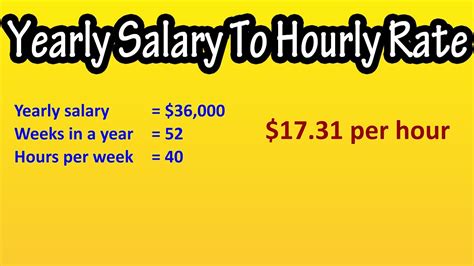How to Find Your Hourly Rate From Your Salary: A Simple Guide
Knowing your hourly rate is crucial, whether you're negotiating a salary, freelancing, or simply want to understand your earning potential. This guide provides a straightforward method to calculate your hourly rate from your annual salary. We'll cover different scenarios and considerations to ensure you get an accurate figure.
Understanding the Basics: Annual Salary vs. Hourly Rate
Before diving into calculations, let's clarify the difference:
- Annual Salary: Your total yearly earnings before taxes and other deductions.
- Hourly Rate: Your earnings per hour of work.
Converting your annual salary to an hourly rate requires understanding your working hours. This is where it gets slightly more complex, as it depends on your work schedule.
Calculating Your Hourly Rate: The Standard Method
The most common calculation assumes a standard work year of 40 hours per week, 52 weeks a year. This totals 2080 working hours annually (40 hours/week * 52 weeks/year = 2080 hours/year).
To calculate your hourly rate, use this formula:
Hourly Rate = Annual Salary / 2080
Example: If your annual salary is $50,000, your hourly rate would be:
$50,000 / 2080 = $24.04 (approximately)
Accounting for Variations in Work Schedule
The 2080-hour calculation is a standard, but it doesn't account for variations in work schedules. Here's how to adjust the calculation for different scenarios:
Part-Time Employment:
If you work part-time, adjust the total annual hours accordingly. For instance, if you work 20 hours per week, your total annual hours are 1040 (20 hours/week * 52 weeks/year = 1040 hours/year). Use this adjusted number in the formula:
Hourly Rate = Annual Salary / Total Annual Hours
Salaried Employees with Overtime:
Salaried employees often work beyond their standard hours without additional pay. This calculation won't reflect overtime compensation, only your base hourly rate. Keep in mind that your actual earnings per hour might be higher if you regularly work overtime.
Variable Work Schedules:
For roles with inconsistent hours, accurately tracking your hours over a longer period (e.g., a quarter or a year) is essential for a more precise hourly rate calculation.
Beyond the Numbers: Factors to Consider
While the calculations above are fundamental, consider these factors for a more complete picture:
- Benefits: Your annual salary often doesn't include the value of benefits like health insurance, paid time off, and retirement contributions. These benefits can significantly increase your overall compensation.
- Taxes and Deductions: Remember that your hourly rate is before taxes and other deductions. Your actual take-home pay per hour will be lower.
- Bonuses and Commissions: If your compensation includes bonuses or commissions, these are usually not factored into your base hourly rate.
Mastering Your Hourly Rate Calculation: Key Takeaways
Calculating your hourly rate from your salary is straightforward, but requires careful consideration of your work schedule and other compensation elements. By using the formulas provided and understanding the limitations, you can gain valuable insights into your earnings and effectively negotiate your compensation. Remember to always track your hours accurately, especially if you have a variable work schedule.
